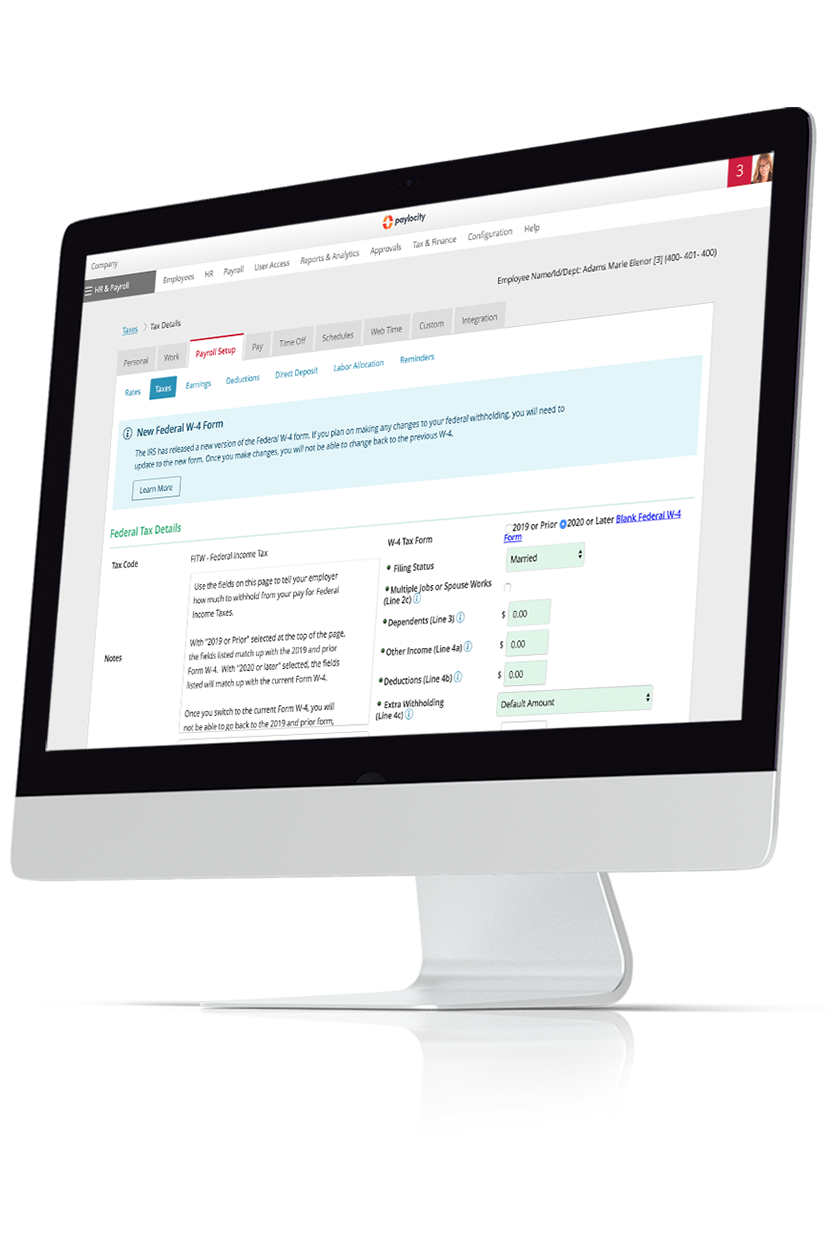Minnesota Payroll Tax Facts
July 01, 2025
Having to comply with unique state taxes and wage laws can make processing payroll doubly daunting. Here’s everything you need to know about these rates and laws for the state of Minnesota.

Minnesota requires a slightly higher minimum wage rate than those required by the federal government in the Fair Labor Standards Act (FLSA). That rate, however, varies based on the size of the organization, as do the local minimum wage rates required by the cities of Minneapolis and St. Paul.
When it comes to processing payroll, Minnesota-based organizations must handle the following taxes in addition to those required by the federal government:
- Personal Income (a.k.a. State Income Tax)
- State Unemployment Insurance (SUI)
- Paid Sick Leave (PSL)
The below information was last updated July 1, 2025. It is not intended as legal or tax advice.
Minnesota Payroll Tax Rates
Minnesota State Income Tax (SIT)
|
Filing Status |
Income Tax Bracket |
2025 Income Tax Rate |
| Single / Individual | $0 - $32,570 | 5.35% of excess over $0 |
| $32,570 - $106,990 | 6.80% of excess over $32,570 | |
| $106,990 - $198,630 | 7.85% of excess over $106,990 | |
| $198,630 or greater | 9.85% of excess over $198,630 | |
| Married (filed jointly) | $0 - $47,620 | 5.35% of excess over $0 |
| $47,620 - $189,180 | 6.80% of excess over $47,620 | |
| $189,180 - $330,410 | 7.85% of excess over $189,180 | |
| $330,410 or greater | 9.85% of excess over $330,410 | |
| Married (filed separately) | $0 - $23,810 | 5.35% of excess over $0 |
| $23,810 - $94,590 | 6.80% of excess over $23,810 | |
| $94,590 - $165,205 | 7.85% of excess over $94,590 | |
| $165,205 or greater | 9.85% of excess over $165,205 | |
| Head of Household | $0 - $40,100 | 5.35% of excess over $0 |
| $40,100 - $161,130 |
6.80% of excess over $40,100 |
|
| $161,130 - $264,050 | 7.85% of excess over $161,130 | |
| $264,050 or greater | 9.85% of excess over $264,050 |
|
Additional Minnesota SIT Details |
|
| Supplemental Withholding Computation | 6.25% |
|
Valid Filing Statuses |
|
|
Exemptions (rates) |
Number of regular and special allowances |
|
Exemptions (individuals) |
|
|
Form W-4 |
Form W-4MN* |
|
Reconciliation Frequency |
Annual |
*Minnesota still bases SIT withholdings on allowances and, in certain circumstances, Form W-4MN must be sent to the Department of Revenue. Review the form's instructions for more information.
Minnesota State Unemployment Insurance (SUI)
SUI provides unemployment benefits to eligible workers who are unemployed through no fault of their own (as determined by state law) and meet the state’s eligibility requirements.
|
Minnesota SUI Tax Details |
|
|
Taxable Wage Base |
$43,000 |
|
Employee Subject to Tax |
No |
|
Rates for Experienced Employers |
0.4% - 8.9% |
|
Rates for New Employers |
Vary by industry and range from 1.0% - 8.9% |
|
Effective Period |
Calendar Year |
|
Voluntary Contributions Allowed |
Yes; only by electronic payment and due within 120 days from the beginning of the calendar year for which the rate is effective. |
|
Additional Surcharge Rates |
|
Minnesota State Disability Insurance (SDI)
SDI benefits are funded by employees through mandatory payroll deductions from each paycheck. Minnesota, however, doesn't require employers to collect an SDI tax.
Minnesota Paid Sick Leave (PSL) Tax
The state of Minnesota doesn't require employers to collect PSL taxes, but it does have a program providing such leave to eligible employees:
| Minnesota ESSL Details | |
| Covered Employers | All |
| Covered Employees | Any who work for their employer for at least 80 hours in a year, including temporary and part-time employees |
| Accrual Method(s) | One hour per 30 hours worked |
| Annual Accrual Cap |
48 hours |
| Carryover Allowed | Yes, but employers can cap total accrual at 80 hours |
| Frontloading Allowed | Yes |
| FAQs | Earned Sick and Safe Time FAQs |
Minnesota Paid Family and Medical Leave (PFML) Tax
Like SDI, Minnesota's PFML program is funded via mandatory payroll deductions and employer contributions. The program will begin collecting contributions on January 1, 2026, and eligible employees can begin filing claims at that same time.
| Minnesota PFML Details | |
| Covered Employers | All |
| Covered Employees | Most Minnesota employees will become eligible after they've earned more than approximately $3,500 in wages within the state over a period of a year. |
| Tax Rate | 0.70% of an employee's wages (split evenly between employers and employees, though employers can pay a greater portion if they want) |
| Wage Base Limit | $176,100 |
| Maximum Leave Available |
12 weeks for a single event, but up to 20 weeks for multiple events within the same year |
| Wage Replacement |
|
| FAQs | Minnesota Paid Leave FAQs |
Miscellaneous Minnesota Tax Information
Minnesota Reciprocal Agreement(s)
Reciprocal agreements are when workers who live and work in different states are only required to pay taxes to the state where they live. Minnesota currently has reciprocal agreements with the following states:
- Michigan
- North Dakota
Residents of these states need to submit Form MW-R to qualify for exemption from Minnesota SIT.
Additionally, the state doesn't provide unemployment wage base credits to employers when an employee moves to Minnesota from another state. In other words, if an existing employee moves to Minnesota at any point in the calendar year, their employer can't claim the employee's wages from before the move against Minnesota's SUI tax calculations.
For example, if Employee A transferred to a worksite in Minnesota after working at a different site in Wisconsin for the prior 6 months, their employer can't claim the wages earned in Wisconsin against Minnesota's SUI wage base limit. Even if Employee A's wages for the calendar year already met Wisconsin's wage base limit, any future wages earned after the transfer will still be subject to Minnesota's wage base limit.
Minnesota Minimum Wage Rates
|
Wage Type |
Minnesota Rates |
Federal Rates |
|
Minimum Wage |
$11.13 |
$7.25 |
|
Tipped Minimum Wage |
N/A |
$2.13 |
|
Actual Tip Credit |
N/A |
$5.12 |
In addition to the state-wide minimum wage rates above, some cities have unique minimum wage rates as well:
|
Location |
Wage Rate |
| Minneapolis |
$15.57
|
| St. Paul |
$13.25 (employers with 5 or fewer employees) $15.00 (employers with 6 - 100 employees) $15.97 (employers with 101 or more employees) |
Paying Payroll Taxes in Minnesota
Minnesota Employer Registration
The below agencies can help with your state-based employer registration, including best practices, account numbers, and unemployment information. Contact the Department of Revenue for withholding tax topics and the Unemployment Insurance Agency for unemployment tax topics.
|
Registration Details |
Department of Revenue |
Unemployment Insurance Agency |
|
Phone |
(651) 282-5225 | (651) 296-6141 |
|
Online Registration |
MN E-Services Homepage | UI Employer Registration Page |
| Registration Instructions | Online registration is required, and account numbers are issued during the registration process. | Online registration is required. Account numbers, temporary IDs, and temporary passwords are issued during the registration process. Permanent IDs and passwords will be mailed in 1-2 weeks. |
| Employer Self-Service Login | MN E-Services Homepage | Minnesota Unemployment Insurance System Login |
Additional Minnesota Payroll Tax Resources
- Department of Revenue Withholding Tax Calculator
- Department of Revenue's Business Taxes and Fees
- Unemployment Insurance Agency Reports
This information is provided as a courtesy and may be updated at any time. It is not intended as legal or tax guidance. If you have questions or concerns, we encourage you to seek the advice of a qualified CPA, tax attorney, or advisor.

Get Taxes Done Right, Without the Stress
We know there's a lot that goes into preparing and filing payroll tax forms. Save time and get support from our expert team. As a Registered Reporting Agent with the IRS, we can help prepare and file all the necessary forms you need to remain compliant - even in the face of changing legislation. Learn more here.